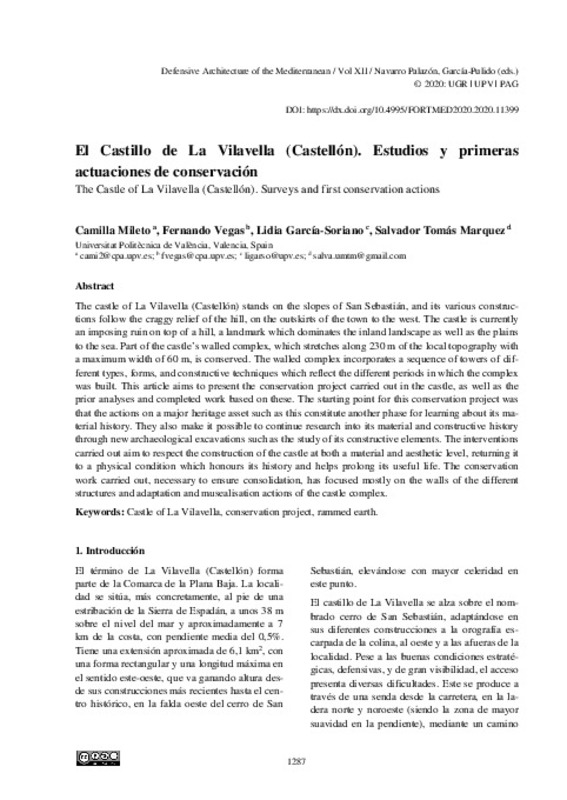Mileto, C.; Vegas López-Manzanares, F.; García Soriano, L.; Tomás Márquez, S. (2020). El Castillo de La Vilavella (Castellón). Estudios y primeras actuaciones de conservación. Editorial Universitat Politècnica de València. 1287-1294. https://doi.org/10.4995/FORTMED2020.2020.11399
Por favor, use este identificador para citar o enlazar este ítem: http://hdl.handle.net/10251/147719
|
Título:
|
El Castillo de La Vilavella (Castellón). Estudios y primeras actuaciones de conservación
|
|
Otro titulo:
|
The Castle of La Vilavella (Castellón). Surveys and first conservation actions
|
|
Autor:
|

 Mileto, Camilla
Mileto, Camilla
 Vegas López-Manzanares, Fernando
Vegas López-Manzanares, Fernando

 García Soriano, Lidia
Tomás Márquez, Salvador
García Soriano, Lidia
Tomás Márquez, Salvador
|
|
Entidad UPV:
|
Universitat Politècnica de València. Departamento de Composición Arquitectónica - Departament de Composició Arquitectònica
Universitat Politècnica de València. Centro de Investigación Arquitectura, Patrimonio y Gestión para el Desarrollo Sostenible - Centre d'Investigació Arquitectura, Patrimoni i Gestió per al Desenvolupament Sostenible
Universitat Politècnica de València. Escuela Técnica Superior de Arquitectura - Escola Tècnica Superior d'Arquitectura
Universitat Politècnica de València. Instituto Universitario de Restauración del Patrimonio - Institut Universitari de Restauració del Patrimoni
|
|
Fecha difusión:
|
|
|
Resumen:
|
[EN] The castle of La Vilavella (Castellón) stands on the slopes of San Sebastián, and its various constructions follow the craggy relief of the hill, on the outskirts of the town to the west. The castle is currently
an ...[+]
[EN] The castle of La Vilavella (Castellón) stands on the slopes of San Sebastián, and its various constructions follow the craggy relief of the hill, on the outskirts of the town to the west. The castle is currently
an imposing ruin on top of a hill, a landmark which dominates the inland landscape as well as the plains
to the sea. Part of the castle’s walled complex, which stretches along 230 m of the local topography with
a maximum width of 60 m, is conserved. The walled complex incorporates a sequence of towers of different types, forms, and constructive techniques which reflect the different periods in which the complex
was built. This article aims to present the conservation project carried out in the castle, as well as the
prior analyses and completed work based on these. The starting point for this conservation project was
that the actions on a major heritage asset such as this constitute another phase for learning about its material history. They also make it possible to continue research into its material and constructive history
through new archaeological excavations such as the study of its constructive elements. The interventions
carried out aim to respect the construction of the castle at both a material and aesthetic level, returning it
to a physical condition which honours its history and helps prolong its useful life. The conservation
work carried out, necessary to ensure consolidation, has focused mostly on the walls of the different
structures and adaptation and musealisation actions of the castle complex.
[-]
|
|
Palabras clave:
|
Fortifications
,
Mediterranean
,
Modern age
,
Built Heritage
,
Castle of La Vilavella
,
Conservation Project
,
Rammed earth
|
|
Derechos de uso:
|
Reconocimiento - No comercial - Sin obra derivada (by-nc-nd)
|
|
ISBN:
|
9788490488560
|
|
DOI:
|
10.4995/FORTMED2020.2020.11399
|
|
Editorial:
|
Editorial Universitat Politècnica de València
|
|
Versión del editor:
|
http://ocs.editorial.upv.es/index.php/FORTMED/FORTMED2020/paper/view/11399
|
|
Título del congreso:
|
FORTMED2020 - Defensive Architecture of the Mediterranean
|
|
Lugar del congreso:
|
Granada, Spain
|
|
Fecha congreso:
|
Octubre 01-03,2020
|
|
Código del Proyecto:
|
info:eu-repo/grantAgreement/AEI/Plan Estatal de Investigación Científica y Técnica y de Innovación 2017-2020/RTI2018-095302-B-I00/ES/LA ARQUITECTURA DE TIERRA EN LA PENINSULA IBERICA: ESTUDIO DE LOS RIESGOS NATURALES, SOCIALES Y ANTROPICOS Y ESTRATEGIAS DE INTERVENCION E INCREMENTO DE LA RESILIENCIA/
|
|
Agradecimientos:
|
La arquitectura de tierra en la península ibérica: estudio de los riesgos naturales, sociales y antrópicos y estrategias de intervención e incremento de la resiliencia” concedido por Ministerio de Ciencia, Innovación y ...[+]
La arquitectura de tierra en la península ibérica: estudio de los riesgos naturales, sociales y antrópicos y estrategias de intervención e incremento de la resiliencia” concedido por Ministerio de Ciencia, Innovación y Universidades (ref. RTI2018-095302-B-I00).
[-]
|
|
Tipo:
|
Capítulo de libro
Comunicación en congreso
|









